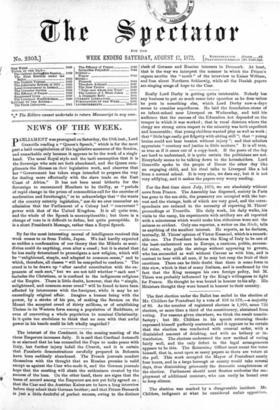For the first time since July, 1870, we are absolutely
without news from France. The Assembly has dispersed, society in Paris has gone to the sea-side, the peasantry are occupied with the har- vest and the vintage, both of which are very good, and the corre- spondents are reduced to the necessity of reporting M. Thiers' proceedings at Trouville. His daily work, his daily walks, his visits to the camp, his experiments with artillery are all reported with a minuteness which would make him ridiculous were not the animus so evident. Only one reporter, a writer on the Siècle, tells us anything of the smallest interest. He reports, as he declares, textually, M. Thiers' opinion of Victor Emanuel, which is a remark- able one. The President believes the King of Italy to be one of the least-understood men in Europe, a cautious, politic, success- ful ruler, who pulls the strings without appearing to govern, who has succeeded as well without Cavour as with him, and is content to bear with all men, if he may but reap the fruit of their exertions. There can be little doubt that there is some force in this view, which is that of many Italians, and is confirmed by the fact that the King manages his own foreign policy, but M. Thiers was probably influenced by the King's willingness to fight for France. He thought he was bound in honour to his ally. his Ministers thought they were bound in honour to their country.


































